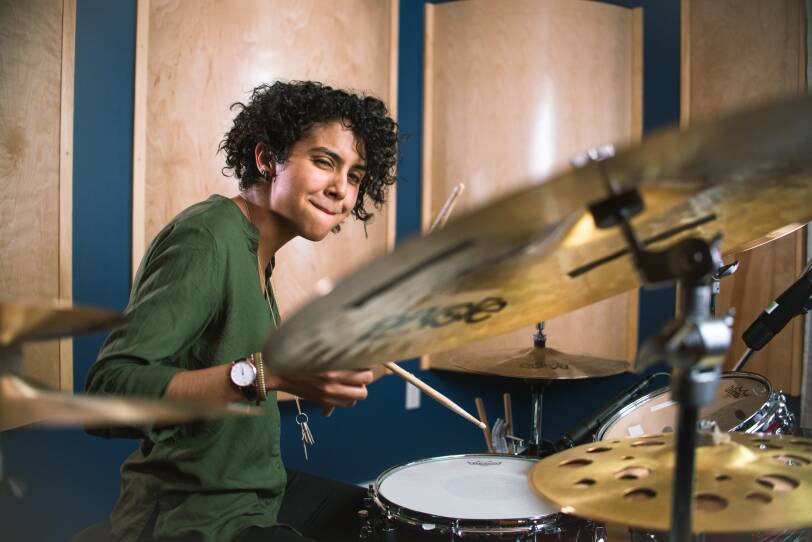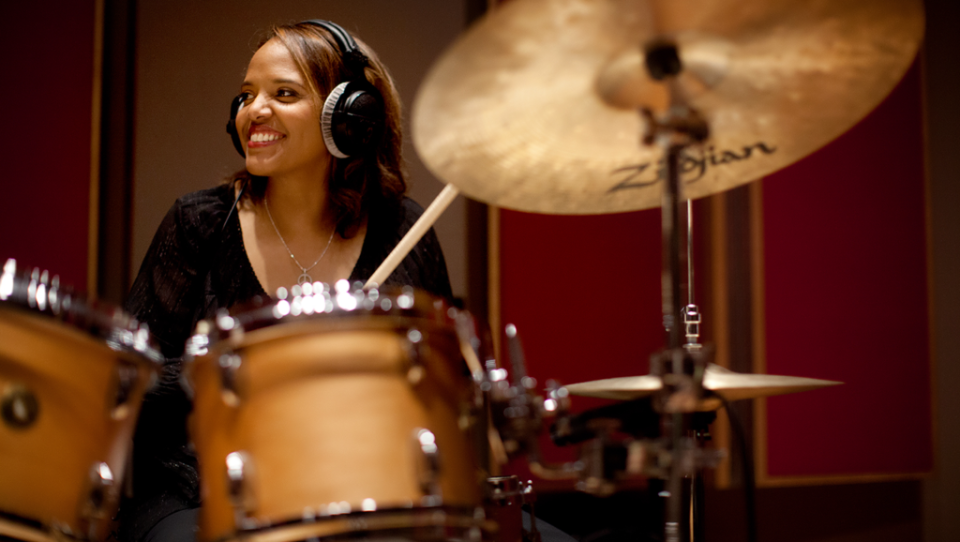Updated at 3:49 p.m. on March 7
When I asked drummer and Berklee faculty Terri Lyne Carrington which of the damning stats concerning women in a best-of-2019 jazz critics poll stood out to her most, she gave a simple answer: "None of them are surprising to me."
The poll in question was the 2019 NPR Jazz Critics poll of the year’s 50 best jazz releases. According to research from NPR’s Lara Pellegrineli, 58% of albums selected had no women musicians, and 58% of those albums had no women that were considered core personnel at all. Women led or co-led only 21% of the leading albums. And women accounted for just 7% of the critics who contributed to that poll in the first place.
That data is prominently featured on the website forNext Jazz Legacy, a collaboration between New Music USA and Berklee Institute of Jazz and Gender Justice, led by Artistic Director and drummer Terri Lyne Carrington. The numbers, they declare, are self-explanatory; it’s the reason why Next Jazz Legacy exists.
The program accepted its first class of musicians this year and the recipients are just beginning their one-year residencies.
Broadly speaking, Next Jazz Legacy uses the “guiding principles of gender and racial justice” to match women and non-binary jazz musicians with creative mentors and apprenticeships. In the context of creative work, “exposure” may be a word that garners strong reactions, but according to Carrington it might be the singularly most important aspect of a young musician’s career. When she was ten, trumpeter Clark Terry took her to Wichita, Kansas, where she met drummer Buddy Rich. “There's like a chain of events that happens once you have opportunities... and the more opportunities you have, the more opportunities come, if you have the talent,” said Carrington. “There's no substitute for experience and exposure with masterful musicians.”
A recurring theme among program leaders that I talked to was an excitement to give a new generation of musicians an on-ramp that was much harder to find a few decades ago. Guitar veteran, Boston native and current Brooklynite Mary Halvorson, who is working with trombonist Kalia Vandever, reflected on her own early career experience. “When I was growing up, I had very few female mentors,” she said. “I was very lucky in that I had some really wonderful male mentors, but it did always feel like something that was missing a little bit that I think would have been really helpful to me.”
The Next Jazz Legacy’s inaugural cohort is seven strong, and among them are two Boston-based musicians, drummer Ivanna Cuesta Gonzalez and pianist Anastassiya Petrova. They were both involved with Berklee’s Jazz and Gender Justice Program, but as the Kazakhstan-native Petrova pointed out, this is a career opportunity that doesn't require you to be enrolled in conservatory. As many former students know, musical or not, graduation doesn’t necessarily confer a bounty of job opportunities. “It's really a powerful tool for a lot of female jazz artists to use after graduation, because sometimes you need that little push after school,” said Petrova, who has an apprenticeship with Chris Potter and a creative mentorship with Kris Davis.

Ivanna Cuesta — who will be working with Wayne Shorter and Esperanza Spalding — sees her music as “clearest way to express an idea.” Case in point: despite early exposure to jazz (she cites her father’s appreciation for Weather Report as her entry-point into the music of Shorter), her youth in the Dominican Republic did not necessarily encourage girls to get into the kind of music she wanted to play. “I grew up with people saying, ‘Oh, this is not for girls,' or like, 'You should do something else’,” she explained. But sitting at that kit is a way of communicating something to the contrary, that “you can do whatever you want. You can be a drummer, you can be a composer. It doesn't matter what you are at the end, it's just like, do you.”

When asked about the research concerning that 2019 NPR poll, Carrington did point out an inescapable irony. The musicians chosen for the list’sheader photoare all women: Val Jeanty, Kris Davis, and Carrington herself.
This concentration of excellence at the top, argued Carrington, is never going to be representative of the musical community as a whole. “You can't say that women are doing well if they're in the top 10 and they have, you know, 30, 40, 50 percent of albums,” she explained. “You have to look through, say, the top 100 and make sure that women and non-binary musicians are integrated into the full lock. Because what happens is, [at] the top, you're only dealing with, you know, the absolute cream of the crop. And then that kind of suggests that they're exceptions.”





